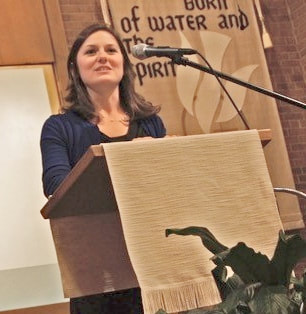|
By Rev. Hewitt-Newson  Like many other Baptist women in ministry, the story of my call should have really started many years before it “officially” did. Anyone who knew me well probably could have intuited I’d be a pastor from a very young age, as I practiced sermons in my childhood bedroom. But I was in a denomination that didn’t recognize God’s longing for women to be pastors, so despite a very supportive youth pastor, I really couldn’t visualize my calling until I stepped outside my home church and eventually into an Honors Thesis researching how Presbyterian women ministers had gained new understandings of God and the church since becoming mothers. Hearing their stories, suddenly pastoring became a live possibility, and I began to feel confidence that I had a call which would not be inhibited in any way by my gender. How it Started: Giving the benediction at my ordination service at Northwest Baptist Church in Winston-Salem in 2011.At Wake Forest University School of Divinity, I found a wide-open, inclusive community that prepared me well for ministry in all its creative forms. It was there that I also discovered BWIMNC when I was nominated by the school to receive a BWIMNC scholarship. What a gift! Not only the money, but the welcome into a community of women ministers (and some men!) that continues to be one of the most influential networks in my life today. A number of years later, after a sojourn in California as a hospital chaplain, I would return to North Carolina and find myself in congregational ministry and on the board of BWIMNC. I’m still proud of the work we did while I was serving to bring on our very first Executive Director, Ka’thy Gore Chappell, in 2019. I have now been ordained for ten years and find myself in my third pastoral position. In each of these positions I’ve had to navigate the challenges that face many women ministers: ministering through pregnancy and early motherhood, mental health ups and downs, and now having spent a year being both a stay-at-home parent while also being a pastor during the pandemic. I have felt the support of my fellow women ministers in these challenges and have bonded with many over the shared paths we have walked. How it’s Going: Preparing to record a virtual sermon on my porch in Raleigh in 2020.In September of 2020, amidst the pandemic, I accepted a call to pastor at Emmaus Way, a faith community in Durham that describes itself as an “open table community captivated by the gospel.” In this role, I get to live out my passion for forming creative, inclusive intergenerational community as I work with the congregation to re-shape its worshiping life given its recent baby boom (a third of our community is now children under 16). One of the things I love most about this community is its commitment to non-hierarchical leadership. Emmaus Way has sought to break down many of the divisions between laity and clergy, and between clergy persons themselves; it is empowering and constantly challenging stepping into such an egalitarian space. These days I find myself dreaming of seeing more and more women not only working as senior pastors, but helping transform models of church leadership and pastoral authority – helping stretch the imaginations of our congregations to see what truly liberating, egalitarian leadership can look like.
0 Comments
Leave a Reply. |
AuthorWrite something about yourself. No need to be fancy, just an overview. Archives
July 2021
Categories |

 RSS Feed
RSS Feed